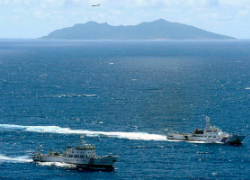
Maritime disputes between the Japanese and Chinese continue to escalate. The Japanese-named Senkaku Islands, and the Chinese-named Diaoyu Islands continue to be a major source of conflict between the two nations. Last week, the situation escalated when Japan scrambled fighter jets after a Chinese plane flew over the islands. Though other island disputes between these and other countries exist, this is the first time the dispute over these islands has involved aircraft. These territorial tensions have only risen since Japan purchased three of the islands from a private owner three months ago.
Both countries have attempted to claim the right to these islands since the United Nations survey declared that the islands were rich in resources, the most important being oil. The issue has only increased as oil prices have risen in both countries. This latest action on the part of the Chinese is apparently one part of a strategy of steady escalation in an attempt to reclaim the islands. Since September, Chinese ships have been spotted in waters close to the islands, including warships and law enforcement patrol boats.
The presence of the Chinese Navy and Air Force is only making the situation more dangerous. China is trying to “unilaterally change the status quo of the islands” by using its forces as evidence of their longstanding claim over the islands. All action taken has been in hopes of deterring Japan from further developing the islands, but this recent escalation goes to show that the problem could soon get out of hand. Not only is the situation, which has enraged Chinese and Japanese citizens alike, becoming more volatile, it is also causing economic damages to both nations. Reports are now saying that these economic consequences could be disastrous.
The United States has not abstained from making declarations on these disputes. While the United States maintains that it takes no side on this territorial dispute, Washington acknowledged its belief that the islands belong to the Japanese. The United States has also officially voiced its concerns over the situation, stating that rising tensions and miscalculations could have serious negative consequences.
There seems to be no sign of tensions easing in the near future either. Japan maintains that it will strengthen the surveillance power of its air force and continues to lodge complaints with the Chinese government over the dispute. As Japan maintains official control over the islands, China’s recent actions are a violation of international law, which forbids one nation from entering another nation’s airspace without having permission. Furthermore, a nation also has the right to expel unauthorized aircraft with force. One can only hope that force will not be necessary to resolve this dispute.
Bailey Woods is a 2L and a staff editor on the Denver Journal of International Law and Policy

